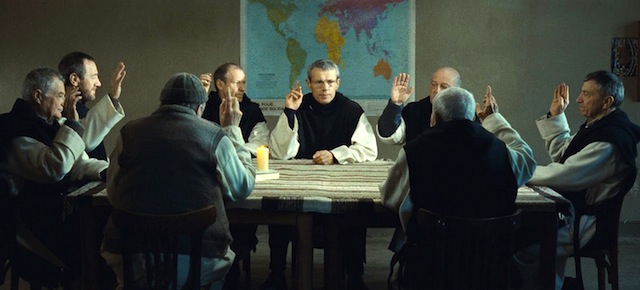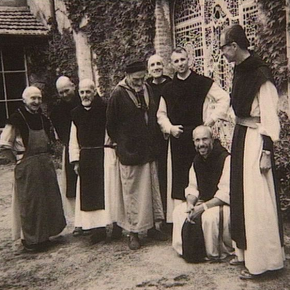
 A lot of what Mockingbird seeks to do is to locate everyday echoes of eternal truths. We keep an eye out for anything that helps us grasp and/or communicate the Gospel a bit more clearly. We look for cultural and dramatic aids, if you will, which underscore the depth and universality of God’s reality. I like to think that we catch a glimpse of grace whenever we come across such instances of forgiveness, mercy or love. But when we point to one of these things, we’re not necessarily saying, “That’s God at work”. God’s grace often works in highly internal ways after all, and since I can’t open myself up and show you those places, I can instead point to a particular thing – a movie, song, story, work of art, current event, take your pick – and say, “That’s what grace is like.” It’s an illustration or fresh approximation of the thing, rather than the thing itself (which by definition cannot be contained by metaphor).
A lot of what Mockingbird seeks to do is to locate everyday echoes of eternal truths. We keep an eye out for anything that helps us grasp and/or communicate the Gospel a bit more clearly. We look for cultural and dramatic aids, if you will, which underscore the depth and universality of God’s reality. I like to think that we catch a glimpse of grace whenever we come across such instances of forgiveness, mercy or love. But when we point to one of these things, we’re not necessarily saying, “That’s God at work”. God’s grace often works in highly internal ways after all, and since I can’t open myself up and show you those places, I can instead point to a particular thing – a movie, song, story, work of art, current event, take your pick – and say, “That’s what grace is like.” It’s an illustration or fresh approximation of the thing, rather than the thing itself (which by definition cannot be contained by metaphor).
But what about the times we actually see God’s grace play out in the life of an individual, group or community? When the Jesus’ command to love each other as He loved us is fulfilled before our eyes? In those cases, we can claim with relative confidence that God is present – these things simply don’t happen without His grace working in and through us. That is, whenever the Great Commandment is fulfilled, it’s inevitably a miracle, an outward and visible sign of the grace that is at work within us.
I was confronted with an indelible example of this in the recent film, Of Gods and Men. Of Gods and Men is much more than a movie “based on a true story” (which usually doubles as a warning for saccharin unreality!). Rather, it is a faithful portrayal of actual events. Just Google “Martyrs of Tibhirine” and you’ll see that these were real men and real events (the picture above is of the actors, the one below is the monks themselves!).
 The film deals with the civil unrest and guerilla uprising that occurred in Algeria during the early to mid-90’s, in particular how the conflict disrupts the life of a Trappist (Cistercian) monastery in the village of Tibhirine and the Islamic community that had grown up around them.
The film deals with the civil unrest and guerilla uprising that occurred in Algeria during the early to mid-90’s, in particular how the conflict disrupts the life of a Trappist (Cistercian) monastery in the village of Tibhirine and the Islamic community that had grown up around them.
The movie’s primary theme is what we might call Godly love – loving one another as Christ loved us. The monks and their Islamic neighbors lived in complete harmony and mutual cooperation. You see early in the movie that there was genuine love between the monastic community and those outside its walls.
The monks grew much of their own food and shared it with the village. One of the monks, Brother Luc, was an elderly physician who ran a free clinic in the monastery, seeing upwards of 100 patients from the village and surrounding region every day. An early scene in the movie shows their leader, Dom Christian, having tea and pleasant conversation with the local Imam.
Then the war comes. Virtually every other foreign group chooses to leave, but the monks decide to wait for God to direct them. Shortly after the meeting in which they decide to stay, we see Dom Christian writing a letter and placing it on a table. This is his final testament, to be opened in the event of his demise.
And while their demise does come in the end, in the intervening time these monks grow closer together and closer to the villagers, all in God’s love.
In one of the most important scenes, as they are wrestling with whether to stay, the Imam’s wife asks one of the brothers what they will do. He says to her, “I don’t know, we are like birds on a branch at the moment.” She replies, “No Father, we are the birds and you are the branch. If you leave we shall surely fall.”
There’s so much that can be said for this film: the sweeping cinematography, the beautiful music (chanted by the monks in worship), the touching vignettes of kindness which the monks show to each other and to their neighbors constantly. But what tears your heart out is the Love, and if I may stretch that one step further, the “love your enemies” of the Sermon on the Mount.
We learn at the end of the movie, through Dom Christian’s final testament, that his primary concern was not for his life or his safety, but that those Islamists who would surely kill him would not be confused with what it means to be Islamic. He loved his Islamic friends as Christ would:
My death, obviously, will appear to confirm those who hastily judged me naive or idealistic: “Let him tell us now what he thinks of it!” But these must know that my insistent curiosity will then be set free. This is what I shall be able to do, if God wills: Immerse my gaze in that of the Father, to contemplate with Him His children of Islam as He sees them, all shining with the glory of Christ, fruit of His Passion, filled with the Gift of the Spirit whose secret joy will always be to establish communion and to refashion the likeness, playing with the differences.
Please understand that this is not some prop. The picture above is Dom Christian de Cherge’s actual grave site and it is his actual final testament that is being read. And his final sentence is the most telling in terms of true, absolute, grace-filled and command-fulfilling love:
And I thank you, too, my friend of the last moment, who will not know what you are doing. Yes, for you too I say this thank you and this adieu, to commend you to this God in whose face I see yours. May we find each other happy “good thieves” in Paradise, if it please God, the Father of us both. Amen!
[youtube=http://www.youtube.com/watch?v=klp6-1kgQJQ?rel=0&w=600]

COMMENTS
One response to “My Friend of the Last Moment: Love and Sacrifice in Of Gods and Men”
Leave a Reply













Thanks so much for this, Jeff. This surely was God’s doing. A dead end defeat, and yet that seems to be where the love of God is seen most clearly, and perhaps the only place it is really seen at all. I am reminded of the short 3 year ministry of the poet/priest George Herbert, who seems to have served for nothing but love, and died without any thought of a “religious career”, having completely given up.